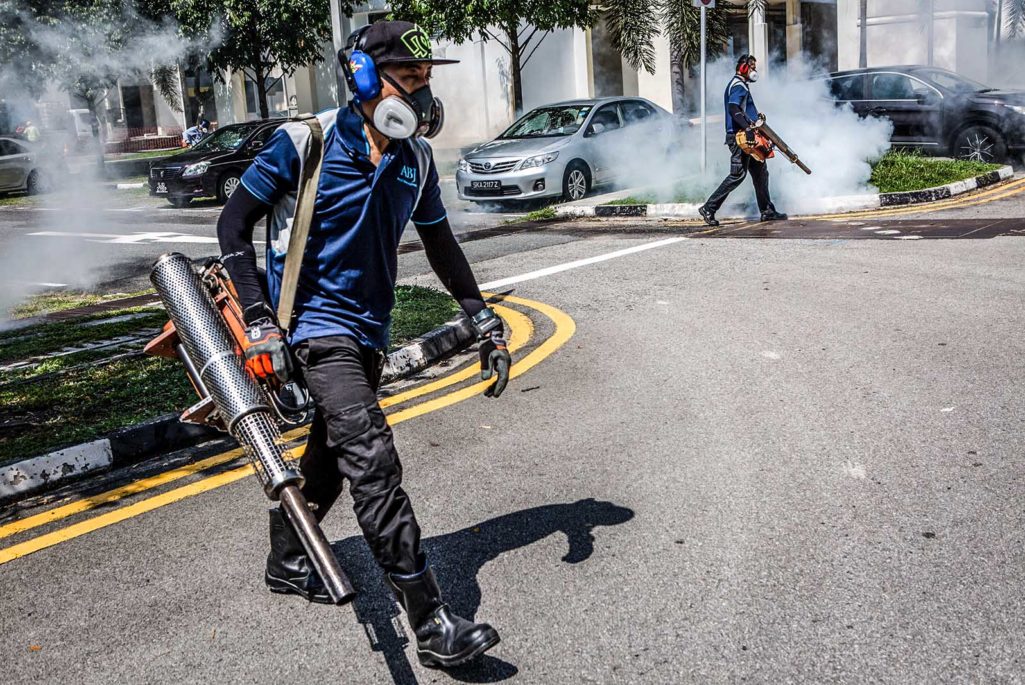Zika and the Risks to Asian Businesses

Pest control workers fumigate the grounds of apartment block in Aljunied on September 3, 2016 in Singapore. Singapore raised the number of Zika cases to 189 this week as government agencies stepped up efforts to control the mosquito-borne virus while neighboring countries like Malaysia and Indonesia introduced thermal scanners at border checkpoints and airports.
Photo: Ulet Ifansasti/Getty Images
More than 380 cases of locally-transmitted Zika virus infections have been confirmed in Singapore since mid-August 2016, resulting in several countries having issued travel advisories against non-essential travel to the city-state. In addition to the health risks faced by residents, the spread of the virus could have negative consequences for businesses and economic growth.
Local government authorities are actively implementing measures to control the spread of the virus, as well as educating people and encouraging them to participate in these efforts.
Impact on Business Activity
The Zika outbreak will likely have significant economic impact on tourist-heavy industries such as hotels, tour agencies, airlines, cruise ships and tourist attractions. Historically, travelers shy away from countries hit by disease; the impact is even more acute in today’s digital era of social media’s “citizen reporting.”
Businesses, by working with relevant government agencies to counter rumors and misconceptions, can educate consumers on the real risks of potential exposures to the virus, highlighting the precautionary measures that have been taken to protect tourists. But such convincing is often not enough for many travelers.
Within businesses—including those outside the tourism industry—there are risks relating to employee efficiency and morale during disease outbreaks. The problem in the region could become more pronounced, particularly if the areas workers and employees live in are marked as outbreak clusters, or if the workplace itself falls within an outbreak cluster, which would impact productivity. Business operations could face disruption if employees cannot report to work. Organizations that depend on external service providers can, in these situations, plan for contingencies.
Another key concern is the possibility of government agencies and regulators invoking a stop work order if the outbreak becomes more serious. This in turn can affect the confidence of business partners and key clients.
Businesses’ supply chains could also be significantly affected if essential supplies of raw materials and key components are disrupted for significant periods if the virus spreads in source countries. This could be a result of potential manpower shortages, heightened border controls or additional quarantine regulations at land, sea and air ports, resulting in delays in the movement of goods from one country to another.
In today’s interconnected world—particularly in Asia where production supply chains are multi-national and complex—any disruption can have a significant impact on manufacturing output, inventory management, delivery times and the supply of raw materials, all of which are critical to the Asian economic growth story. At a micro level, they will have a detrimental impact on businesses’ bottom lines.
In today’s interconnected world—particularly Asia—any disruption can have a dramatic impact on manufacturing output.
Preparation is Possible
For organizations producing similar products in several plants situated in different regions or countries, production levels at other sites could be stepped up to make up for the shortfall from a plant in a Zika-infected area. In case a company does not have spare production capacity, organizations should be nimble and reprioritize their production activities in accordance with the changed environment.
Staff in mission-critical functions such as the information and communications technology (ICT) department need to be protected, as business and operation processes may come to a standstill if ICT services and databases are lost or corrupted. Firms where employees operate in shifts need to minimize the possibility of cross-shift contamination by restricting face-to-face hand-over activities. For shared and other support services including ICT, organizations need to implement and activate, if appropriate, split team operations across two or more separate sites; or activate contingency measures like having a portion of the department staff working from home or another location.
Employee communication is essential during a crisis. Educating and reassuring employees that the organization has their well-being in mind and will not take any steps that could jeopardize their safety can go a long way in boosting employee confidence. Additionally, businesses can provide a brief summary of the situation and list precautions employees ought to take to minimize the possibility of contracting the virus. These actions will reduce negative impacts on reputation, branding and image.
Preparedness and transparency are key to mitigate the risks arising from the spread of the Zika virus. For the region’s economies to limit the impact of the spread of Zika, governments must work closely with businesses and the private sector, and indeed with one another.
Singapore is not the only country in the region to have reported Zika cases this year with Indonesia, the Philippines, Thailand and Vietnam having reported cases too. Limiting the spread of—and damages from—Zika is perhaps an even more pressing requirement in other countries, all of which have large populations and more expansive geographic areas to deal with, and will therefore find it even more challenging to cope with the outbreak than Singapore.


